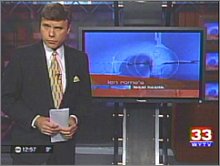Buying the TV News: Why You Can't Trust the News on TV
by www.SixWise.com
For most Americans (75 percent), local TV news represents
a reliable news source -- something to turn to every morning
and evening to get a good grip on what's going on in your
area of the world and beyond. So trusted is the TV news that
over 70 percent of U.S. adults watch network TV or cable news
on a daily or near-daily basis, according to a Harris Poll
from January 2006.
But the real disturbing news? Commercial propaganda,
also known as "fake TV news" or "Video News
Releases" (VNRs), is being aired all over the country
-- on the smallest to the largest networks -- as real, journalistic
news -- and without the public's knowledge.
|

How much of your favorite news program is actually
corporate-funded propaganda?
|
The Center for Media and Democracy (CMD), a non-profit organization
that investigates and exposes public relations spin and propaganda,
exposed just how widespread the use of fake TV news has become
-- and how it is being broadcast as real news -- in a new
report, "Fake
TV News: Widespread and Undisclosed," released in
April 2006.
Meanwhile, CMD, along with Free Press, a media reform group,
have filed formal complaints with the Federal Communications
Commission urging an investigation into TV news fraud and
requesting on-screen labeling for all VNRs and other "phony
news stories."
What are VNRs?
VNRs are produced by corporations, government agencies, PR
firms and other agencies to present a specific message to
journalists. The catch is that these video clips, while appearing
like a regular news segment, are geared toward a specific
market to sell products, spread specific ideas or burnish
an image.
|
Glowing Testimony for
MimyX Eczema Cream?

Three TV stations aired a VNR for the recently approved
MimyX, a prescription skin cream used to treat atopic
dermatitis, or eczema. The piece featured "glowing
testimony" from a professor at the University of
Louisville who is also a dermatologist. What did the
news stations forget to include?
-
The story was actually a VNR funded by Stiefel
Laboratories, the makers of MimyX. The stations
added their own station brands and even their own
health reporters to narrate the piece.
-
The 30 seconds of federally mandated contraindication
warnings, which were even included in the original
VNR. The public saw no safety information for this
drug.
View
the entire MimyX VNR now.
|
"If there is news in your brands we'll find a way to
put your brands in your news. In a sense, it's product placement,
but it's earned a place on the shelf," said Larry Moskowitz,
the president and CEO of Medialink Worldwide, the largest
producer of VNRs, in a Media Daily News report.
"Produced in broadcast news style, VNRs relay the news
of a product launch, medical discovery, corporate merger event,
timely feature or breaking news directly to television news
decision-makers who may use the video and audio material in
full or edited form. Most major television stations in
the world now use VNRs, some on a regular basis,"
Medialink stated.
While VNRs and other public relations material can and should,
arguably, be sent to news agencies, the public is under the
general impression that such propaganda is filtered, rewritten
or otherwise checked out by journalists.
However, according to the CMD report, VNRs are frequently
aired:
-
Without disclosure to viewers
-
Without media outlets conducting their own reporting
-
Without fact-checking their claims
Television is the Most Popular News Source in the United
States
Considering just how many Americans are influenced by what
they see on the TV news, the use of "fake news"
is alarming, if not downright infuriating. Why do TV stations
use these PR pieces as real news?
"They allow newsrooms to do less of their own work without
fear of running out of material before the end of the hour,"
said CBS correspondent Deborah Potter.
It was once thought that this was mostly the case only at
small stations with tight budgets. However, the
CMD report found that the use of VNRs is much more widespread.
"We determined prima facie and scientifically and electronically
that every television station in America with a newscast has
used and probably uses regularly this material from corporations
and organizations that we provide as VNRs or B-Roll or other
terminology we may use," said Moskowitz.
|
National Pancake Week!
To coincide with National Pancake Week, a VNR was played
by four stations, featuring creative new ideas for pancake
dishes.
Not surprisingly, the piece also directed viewers to
visit BettyCrocker.com and to try out the HeartSmart
line of low-fat pancake mix. While this PR piece was
funded by General Mills/Bisquick, none of the stations
disclosed this information as they read the script nearly
verbatim.
If you look at the photo above, you'll see the "reporter"
Mike Morris (who is actually from Medialink, a producer
of VNRs) as he appears in the original VNR (left) and
again on two TV stations.
Another important, yet not mentioned, fact? National
Pancake Week itself was first established in 1985 by
General Mills and Bisquick.
See
the Entire Video Here.
|
Thousands of VNRs Produced Each Year
The CMD report involved a 10-month tracking of 36 VNRs (of
which thousands are produced every year). Some 77 television
stations, which, collectively, reach over half of the U.S.
population, aired these VNRs. Highlights of the CMD findings
include:
-
Each of the 77 stations "actively disguised the
sponsored content to make it appear to be their own reporting."
-
In almost all cases, "stations failed to balance
the clients' messages with independently gathered footage
or basic journalistic research."
-
Stations aired the VNRs in their entirety more than one-third
of the time.
-
Nearly two-thirds of the VNRs tracked were aired in
the Top 50 Nielsen market area, which includes Detroit,
Pittsburgh and Cincinnati.
-
Thirteen VNRs were broadcast in the 10 largest markets,
including New York, Los Angeles, Chicago, Philadelphia
and Boston.
-
None of the 87 VNR broadcasts documented disclosed
the clients behind the PR piece. Only one provided partial
disclosure.
-
In every VNR broadcast, the TV stations made the material
appear like their own, going so far as to add station-branded
graphics and overlays.
-
A station anchor or reporter re-voiced the VNR in
over 60 percent of the cases. Sometimes the reporter repeated
the original VNR's narration word-for-word.
-
47 of the 49 clients behind the tracked VNRs were corporations
that stood to benefit financially from the news coverage.
Take Action
"It's a concern, and it ought to be a concern, frankly,
for viewers if much of the material that they're starting
to get on the news isn't news," Potter said.
If you would like to voice your concerns over fake TV news
broadcasts, CMD provides two
outlets to do so.
-
Send
a letter to the FCC.
-
Report
inside knowledge of fake TV news reporting (because
you work in a TV newsroom, for instance, or have heard
of it from someone who does) to CMD.
Recommended Reading
Check
Out All the Violence Here! ... How I Jolt You into Submission
to Get Your Money
If
You Do Not Read this Column, Something VERY Bad Will Happen
Sources
Center
for Media and Democracy: Fake TV News: Widespread and Undisclosed
Source
Watch: Video News Releases